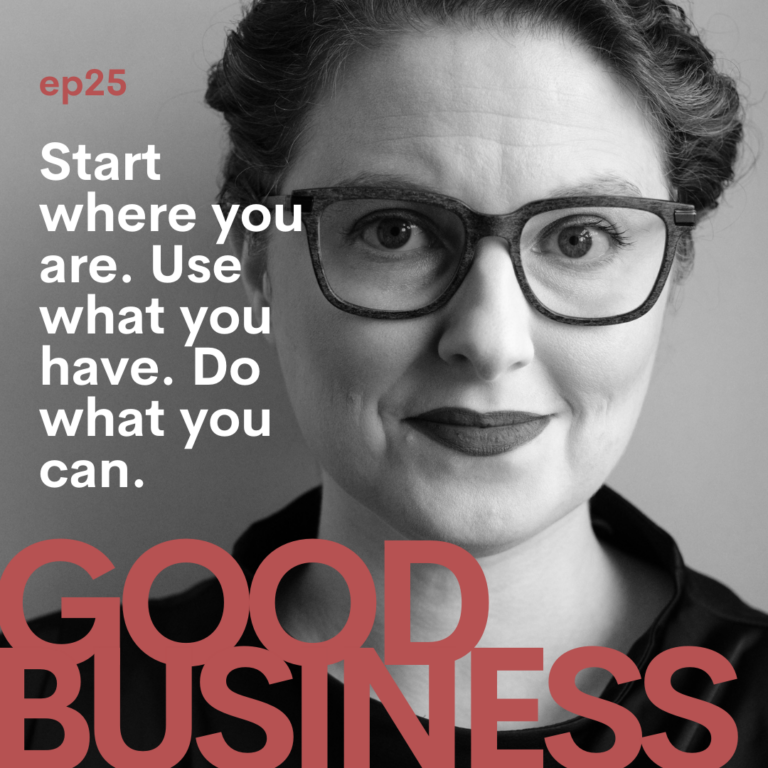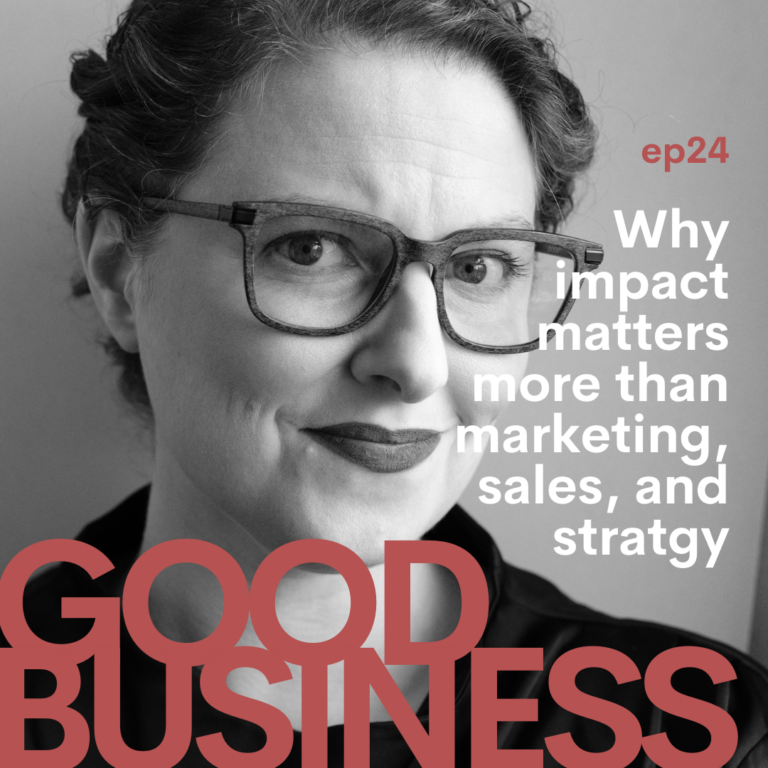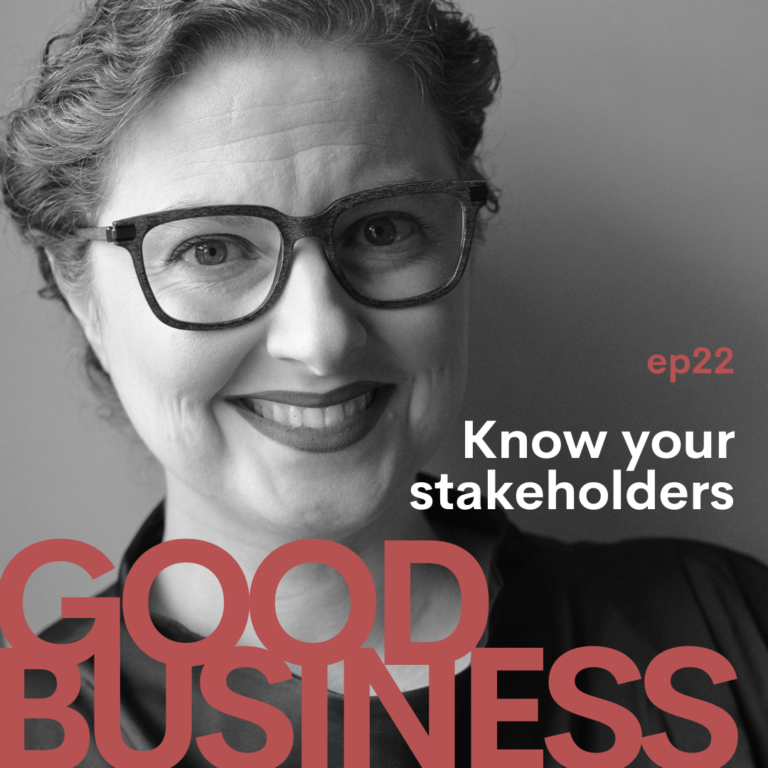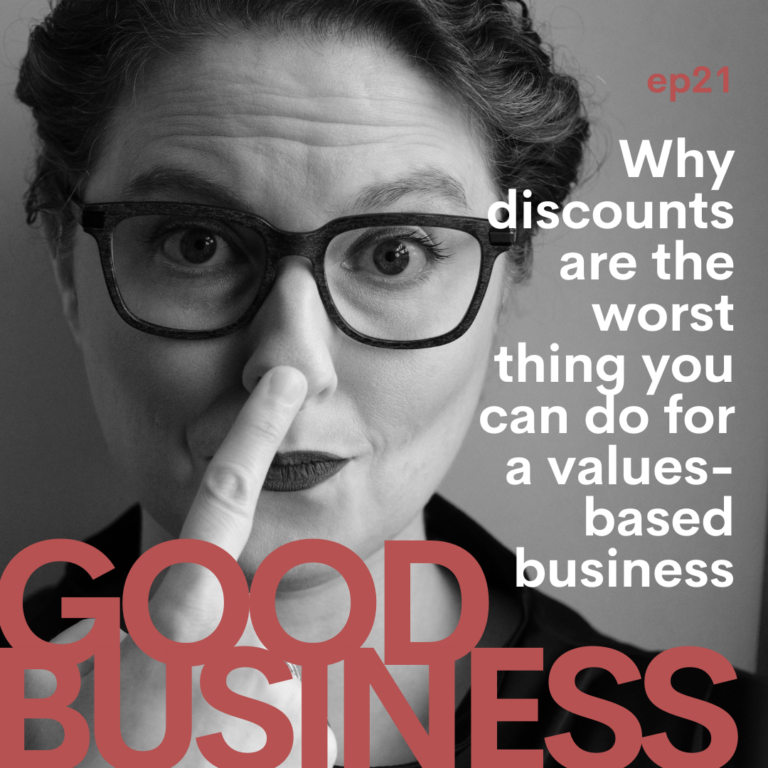Hello, fabulous listeners, and welcome back to another episode of Good Business. Today, we’re diving into a topic that might just flip the script on how you think about your offers: “Why Your Offerings Should Reflect What’s Best for You Before They Reflect What’s Best for Your Clients.” Sounds counterintuitive. I know. Well, stick around because I’m gonna break it down in a way that’s both practical and super powerful.
First, I’m going to talk about what all this has to do with niching and marketing, then I’ll explain exactly how to do this, and finally I’ll dig into how this improves your leadership positioning.
So let’s talk about niching.
We hear this buzzword all the time, right? “Find your niche!” But let’s be real, for many of us, this is both easier said than done and often downright impossible – at least the way most people teach it. I mean who wants to ONLY help one tiny group?
So why bother, right?
But actually, the thing that other marketers get right about niching is that it makes your work easier to market. After all, if you’re only talking to a narrow group of people, it’s way easier to say exactly what they need to hear.
And while I talk about niching based on your values quite a lot, the WAY you offer your work can also speak volumes to a far more specific – and easier to market to – audience. (Starting to connect now?) Essentially, your distinctive approach, your personality, your methodology, and your delivery can be just as effective as niching based on what your people ate for breakfast (probably more so).
So what are we REALLY talking about today? Essentially, we’re talking about creating and framing offers around how you perform at your best both so you can be happier and healthier in your business AND so you can market with more ease.
Rather than offering what everyone else in your industry is offering, craft offers that intrinsically work for you. For example, I do two hour calls once per month with most of my 1:1 clients. This allows me to both work with more people than if I had multiple sessions per month without having to work more than the three days a week that I enjoy.
It also means I get to deep dive with every single client rather than getting stuck in talking about more surface day-to-day issues. The structure itself helps my clients desire and expect the big-thinking, expansive strategy stuff I enjoy the most.
When you create offerings that reflect what’s best for you—your strengths, your weaknesses, and when and how you work best—you naturally carve out a niche without the stress of trying to fit into a pre-defined market segment.
Basically, you’ll attract a very specific group of people who like the WAY you work as much as they like what you’re offering. It also works because it ties into the ever-popular idea that authenticity rules. People crave it, and when you serve it, you attract those who resonate with how you do what you do.
Now, let’s get into why this not only positions you as a better leader and sets a sterling example for your clients. When you put yourself first—not in a negatively selfish way, but in a way that ensures your well-being and passion are at the forefront—you operate from a place of strength and clarity. This isn’t about ignoring your clients’ needs; it’s about ensuring you’re at your best to meet those needs.
When you’re thriving, your clients see a leader who is confident, self-aware, and energetic. This sets a powerful example. You’re teaching them to value themselves, to find their unique path, and to lead with integrity. By prioritizing what’s best for you, you’re showing them that the best way to serve others is by first ensuring you’re in the best position to do so.
And this brings us my holy grail of good business: promise-keeping. The most important thing in any business relationship is trust. When you design your offerings around what’s best for you, you’re more likely to keep the macro, outcome-based promises you make to the people you serve. Why? Because you’re not stretching yourself too thin or overcommitting in areas that drain you.
Promise-keeping isn’t just about doing what you say you’ll do; it’s about consistently delivering the quality and value you said you would. When the structure of your offerings aligns with your needs and preferences, you’re naturally more reliable. Your clients will know they can count on you, not just because you deliver, but because you deliver with excellence and enthusiasm in a well-designed container. And when clients feel like they can confidently trust the structure and boundaries you’ve set up – then you’ve set the stage for a high-trust, high-performing relationship.
Ok, that’s it for me today everyone! As always, thank you for tuning in to Good Business. I hope this episode has given you a fresh perspective on how to shape your offerings and lead with integrity. If you enjoyed this episode, don’t forget to subscribe, share, and leave a review. Until next time, always remember that it is just business. And that’s always personal.
More Episodes
Start where you are. Use what you have. Do what you can. | GB 25
Today’s episode of The Good Business Podcast is all about my very favorite quote in the whole world. “Start where you are. Use what you have. Do what you can.” by Arthur Ashe
Why impact matters as much as marketing, sales, or strategy. Maybe more. | GB24
Today’s episode is less of a lesson than recent episodes. Instead, today we’re making a case for a topic we’ll be talking a LOT more about in the future: IMPACT. What it is. Why it matters. And how to pay attention to it.
Market visibility for people who care about other people | GB23
Today is a branch off of our stakeholder conversation. If you listened to that episode, you should have a clear picture of exactly who matters to you and your work and why, as well as how much time you have for your work without sacrificing what those VIPs need and expect from you. Next up, we talk about exposure, protection, and the responsibility you have to those who matter most.
Know Your Stakeholders | GB22
In this episode, I’m going to walk you through how to think about establishing your stakeholders, the steps you need to take to do so, and how to make decisions based on who they are without compromising those big fat dreams we’ve been talking about.
Pricing Basics: Why discounts are almost never a good idea | GB21
Today’s episode dovetails on our last one, where we talked all about how your value isn’t determined by your price tag. Today, we’re talking about discounts. First, we’ll talk about why businesses offer them, what their purpose is and when they ARE a good idea. Then we’ll talk about why they are probably a bad idea for you and what to do instead.
Pricing Basics: Your value is not attached to your price | GB20
This episode breaks down the popular trope that if you don’t charge a lot, people won’t value your work. First, we talk about the conditions that make this a common piece of advice. Then I lay out why this is complete crap for certain kinds of businesses. Finally, the episode wraps up with a brief primer on how to think about pricing in a way that serves your people AND your bigger dreams for yourself.






